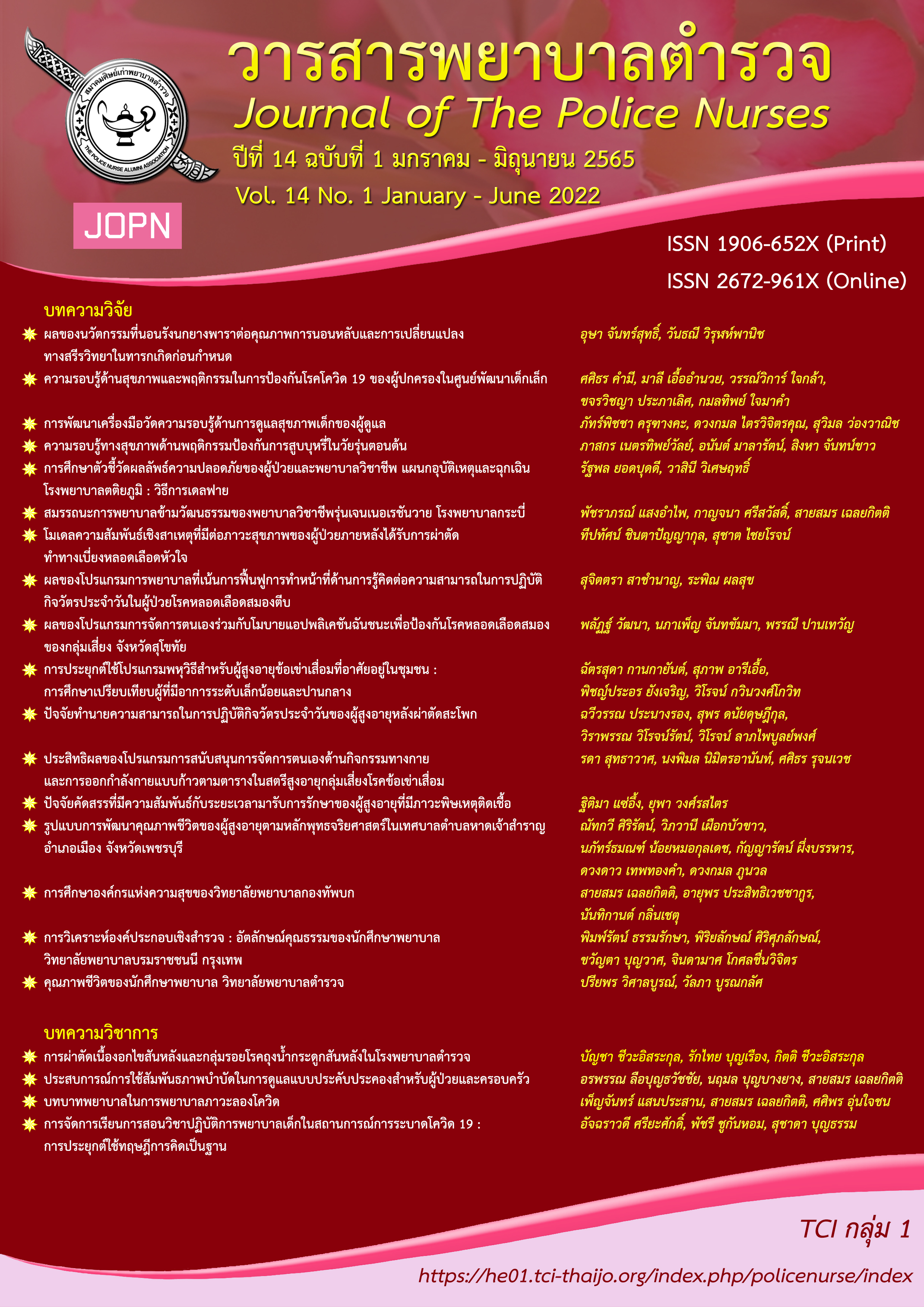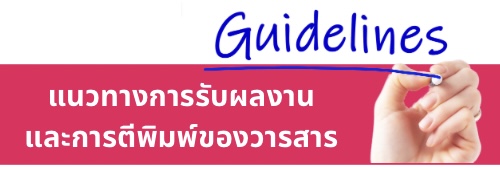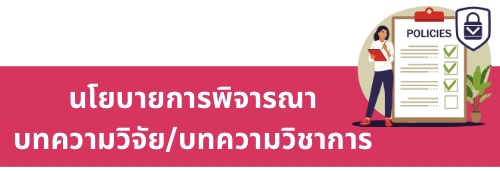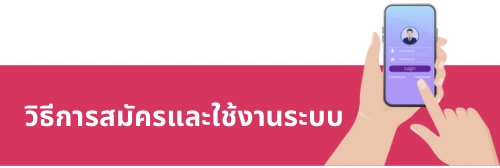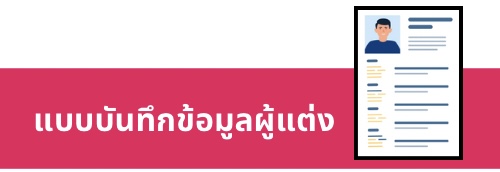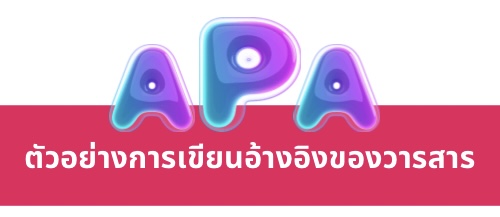การวิเคราะห์องค์ประกอบเชิงสำรวจ : อัตลักษณ์คุณธรรมของนักศึกษาพยาบาล วิทยาลัยพยาบาลบรมราชชนนี กรุงเทพ
คำสำคัญ:
การวิเคราะห์องค์ประกอบเชิงสำรวจ, อัตลักษณ์คุณธรรม, นักศึกษาพยาบาลบทคัดย่อ
การวิจัยนี้เป็นการวิจัยเชิงสำรวจ มีวัตถุประสงค์เพื่อวิเคราะห์องค์ประกอบเชิงสำรวจของอัตลักษณ์คุณธรรมนักศึกษาพยาบาล ตัวอย่าง คือ นักศึกษาพยาบาลชั้นปีที่ 1 - 4 วิทยาลัยพยาบาลบรมราชชนนี กรุงเทพ จำนวน 575 คน เก็บรวบรวมข้อมูลโดยใช้แบบสอบถามอัตลักษณ์คุณธรรมนักศึกษาพยาบาล ผ่านการตรวจสอบความเที่ยงตรงเชิงเนื้อหา มีค่าดัชนีความตรงเชิงเนื้อหาเท่ากับ .88 และมีค่าความเชื่อมั่นทั้งฉบับเท่ากับ .91 วิเคราะห์ข้อมูลโดยใช้สถิติเชิงบรรยาย และการวิเคราะห์องค์ประกอบเชิงสำรวจ
ผลการวิจัยพบว่า พบว่า องค์ประกอบอัตลักษณ์คุณธรรมของนักศึกษาพยาบาล ประกอบด้วย 9 องค์ประกอบ ได้แก่ 1) วิทยาลัยเป็นมิตรกับสิ่งแวดล้อม 2) หลักปรัชญาเศรษฐกิจพอเพียง 3) เทคโนโลยีและนวัตกรรมนำสมัย 4) ความสามัคคี 5) ความซื่อสัตย์ 6) ความมีวินัย 7) จิตบริการ 8) การคิดอย่างมีวิจารณญาณ และ 9) การมีส่วนร่วม ทั้ง 9 องค์ประกอบสามารถร่วมกันอธิบายอัตลักษณ์คุณธรรมได้ร้อยละ 57.214 เมื่อพิจารณารายองค์ประกอบพบว่า องค์ประกอบที่ 1 – 9 สามารถอธิบายความแปรปรวนของอัตลักษณ์คุณธรรม ร้อยละ 22.218, 7.882, 5.167, 4.703, 4.059, 3.770, 3.345, 3.161, 2.908 ตามลำดับ ดังนั้น ผลการวิจัยนี้ชี้ให้เห็นถึงองค์ประกอบอัตลักษณ์คุณธรรมของนักศึกษาพยาบาลสามารถนำไปใช้ในการกำหนดนโยบาย การประเมิน และสร้างแนวทางการส่งเสริมอัตลักษณ์คุณธรรมของนักศึกษาพยาบาล วิทยาลัยพยาบาลบรมราชชนนี กรุงเทพ อันจะส่งผลให้ได้บัณฑิตพยาบาลที่พึงประสงค์
Downloads
เอกสารอ้างอิง
Hair, J., Black, W. C., Babin, B. J, Anderson, R. E., & Tatham, R. L. (2010). Multivariate data analysis. New Jersey, NJ: Upper Sandle River, Prentice Hall.
Janthamungkhun, J., Rachabootr, N., Tangpant, C., Siangphrao, K., & Trakunkarn, K. (2019). Development of a morality, ethics and nursing laws competency test for nursing students. Academic Journal of Phetchaburi Rajabhat University, 9(2), 132-143.
Khorphon, S., Pankeaw, J., Sarobol, T., Choopun, K., Chomchan, S., & Boonlue, N. (2019). Promoting of critical thinking skills in nursing students through reflective thinking. Nursing Journal, 46(1), 87-101.
Musikthong, J., Puwarawuttipanit, W., & Udomphanthurak, J. (2017). Learning experiences from clinical practice in medical units and perceived self-development of nursing students in a bachelor of nursing program. Nursing Journal of the Ministry of Public Health, 27(2), 181-197.
Nawsuwan, K., & Sattayarak, W. D. (2016). The components of nursing student identity in nursing colleges, Ministry of Public Health. HCU Journal of Health Science, 19(38), 77-92.
Nawsuwan, K., Wisalaporn, S., & Sattayarak, W. D. (2015). Strategies to develop the nursing students’ identity in nursing colleges, Ministry of Public Health. Hatyai Journal, 13(2), 117-132.
Thailand Nursing and Midwifery Council. (2018). Standards for graduate studies level bachelor of nursing science, B.E. 256. Retrieved from https://www.tnmc.or.th/images/userfiles/files/Edit.pdf
Office of the Education Council. (2017). The national education plan 2017-2036. Bangkok: Prigwhan Graphic.
Polit, D. F., & Beck, C. T. (2017). Nursing research: Generating and assessing evidence for nursing practice (10th ed.). Philadelphia, PA: Lippincott, Williams & Wilkins.
Santwanpas, N., Wanngamwiset, S., Pratanvorapanya, W., & Kooariyakul, A. (2020). The driving model of a moral college: A case study of Boromarajonani College of Nursing, Nonthaburi. Journal of The Police Nurses, 12(1), 197-209.
Sirisupluxana, P., & Thammaraksa, P. (2021). Meanings and behaviors of moral identity: Perceptions of nursing students. Boromarajonani College of Nursing, Uttaradit Journal, 13(2), 231-25.
Sngounsiritham, U., & Sirakamon, S. (2017). Ethical behaviors of professional nurses. Chiang Mai: Faculty of Nursing, Chiang Mai University.
Thongsom, P., Janpet, A., Siriporn, L., & Hanbenjapong, C. (2020). Graduated identity development process of colleges under Praboromaratchanok Institute Jurisdiction, Ministry of Public Health. Journal of Health Science, 29(3), 547-56.
Wichainate, K. (2014). Reflective thinking: Teaching students to develop critical thinking in nursing practice. Journal of The Police Nurse, 6(2), 188-199.
ดาวน์โหลด
เผยแพร่แล้ว
รูปแบบการอ้างอิง
ฉบับ
ประเภทบทความ
สัญญาอนุญาต
ลิขสิทธิ์ (c) 2022 วารสารพยาบาลตำรวจ

อนุญาตภายใต้เงื่อนไข Creative Commons Attribution-NonCommercial-NoDerivatives 4.0 International License.
ผลงานที่ได้ตีพิมพ์แล้วจะเป็นลิขสิทธิ์ของวารสารพยาบาลตำรวจ

